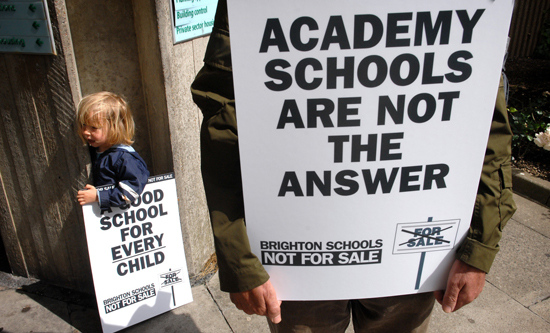
Labour’s pledge to recast the state education system as a National Education Service providing free ‘cradle-to-grave’ educational provision ‘as a right, not a privilege’ at first sight seems radical. However, to implement this commitment, a Labour government would have to be prepared, not merely to raise the funds, but to challenge the huge private sector interest in the education business world that they themselves invited in and funded.
Outsourcing every aspect of educational infrastructure from exam boards to payroll has led to significant privatisation of the state education system. The UK takes a large slice of the £130bn educational technology market, with schools paying £900m a year to profit business providers. A complete reversal of Labour’s financial collaboration with corporate interests would be necessary to implement recommendations of the manifesto. The pledge to return to ‘national pay bargaining for teachers and support staff’, for example, is not possible without the abolition of academies, ‘free’ and ‘faith’ schools, as well as selective Specialist, Beacon and City Technology Colleges. These institutions set their own curriculums, admissions policies and wages and conditions for staff and are ‘stand-alone’ autonomous organisations although financed by the state.
From 1997 onwards Labour diverted funding away from Local Education Authorities (LEAs) to deliberately undermine their rights and responsibilities for providing school places for all the children in the area, including migrant, special needs or traveller children. The resulting fragmentation of state schools led directly to competition between schools fighting for league table position and bigger budgets. Other manifesto promises, on class size for example, equally depend on an end to school autonomy and a return to national standards and duty of care. The manifesto hints that a return of powers to LEAs must be made, ‘Labour would allow local authorities to open schools, and to require joined up admissions policies across schools’. But the manifesto fails to state the obvious. The 4,000 academy schools, 7,000 ‘faith’ schools and other selective schools distort the chance of fair funding and must be abolished and absorbed back into local responsibility.
The manifesto pledge to reintroduce maintenance grants for university students and abolish university fees will be welcomed. The first student tuition fees, introduced by Labour Education Secretary David Blunkett in 1998 were £1,000 per year. Since then the average student debt has grown to about £40,000. The largely privatised Higher Education sector would have to be freed from the corporate interests that now dominate.
All of Labour’s manifesto proposals on education are desirable. The only way they could be implemented is by an all-out fight to abolish the vested private interests that are controlling and making profits from the long-term democratic interests of the people. This the Labour Party will not do.
Fight Racism! Fight Imperialism! 257 May/June 2017 Election Special




